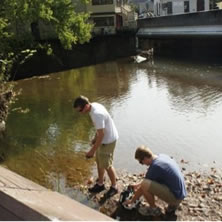Student Research at Seton Hall
At Seton Hall, students not only learn about cutting-edge research, they contribute to it. National Organizations such as the Council on Undergraduate Research recognize participation in disciplinary research as an experience with unique value for deep learning and building credentials for careers.
Provost's Office Initiatives for Student Research
The Office of the Provost is committed to supporting meaningful student engagement in research and scholarship across disciplines. Through competitive opportunities, mentoring, and visibility at national and regional forums, we provide students with platforms to showcase their work and gain recognition beyond the classroom.
Big East Undergraduate Student Research Competition
Each year, the Big East Conference hosts a Student Research Poster Competition, bringing together students from across member institutions to present original research in a professional setting. This highly visible event allows Seton Hall students to share their work with peers, faculty, and judges from across the Big East, gaining valuable experience in communicating their research to a broader audience.
Middle States Commission on Higher Education (MSCHE) Student Poster Presentations
The Middle States Commission on Higher Education invites students from accredited institutions to present their research during the MSCHE Annual Conference. This selective opportunity highlights the achievements of Seton Hall students at a regional level, while fostering professional development and networking with higher education leaders. Participation affirms the University’s commitment to student research as a core element of academic excellence.
Services Offered by the University Libraries
Some of our Discipline-Specific Research
Active laboratories in several departments at Seton Hall feature teams of faculty, graduate students, and undergraduates, with undergraduates even becoming co-authors of published articles in some cases. Please see below some examples of some of our more active research areas with contact information for interested students.
Diplomacy
The School of Diplomacy and International Relations hosts a collaborative research space called the Diplomacy Lab, or “DiploLab”. Each year, a cohort of Diplomacy undergraduates is recruited to work on faculty research projects, including data collection, survey and interview analysis, and research and policy writing. Students rotate between working on faculty projects and creating original research projects of their own, under faculty guidance. Notably, DiploLab students published original analysis in Foreign Policy in January 2021. The DiploLab is directed by Prof. Joseph Huddleston. You can read more about the DiploLab, its students, and its accomplishments here »
Psychology
Dr. Marianne Lloyd’s laboratory investigates why memory errors happen and how to prevent them. This investigation is done by presenting material such as videos, pictures, or words to be remembered and then giving recognition memory or recall tests. To learn more, please email marianne.lloyd@shu.edu.
Economics and Finance
In the Stillman School of Business Economics, Associate Professor of Economics Kurt Rotthoff is interested in applied microeconomics, financial economics, industrial organization, the application of economics and finance to the sports industry, and the economics of education. Students under Dr. Rotthoff's guidance are engaged in a very broad range of aspects of research, from literature review to modeling to data analysis, and select students with larger roles have become co-authors of these published articles. You can contact Dr. Rotthoff at Kurt.Rotthoff@shu.edu.

Biological Sciences
Students interested in environmental issues and public health would be interested in Dr. Tina Chu's ongoing studies on detecting, monitoring and predicting Cyanobacterial Harmful Algal Blooms (CHABs); the effects of overgrowth of cyanobacteria (blue-green algae) and their toxins on animal and humans health in drinking and recreational water. Undergraduates collect water samples, analyze samples with microscopes, flow cytometer and other molecular assays.
Healthcare
Students interested in medical and healthcare fields would be interested in many of the research laboratories wihtin the School of Health and Medical Sciences, that span athletic training (Dr. Leslie Rippon, Dr. Richard J. Boergers), speech-language pathology (Dr. Anthony Koutsoftas, Prof. Caryn Grabowski, Dr. Sona Patel), and other topics associated with the Department of Interprofessional Health Sciences and Health Administration (Dr. Genevieve Pinto Zipp).
NeuroImmune Pharmacology
Sulie Chang's research program, the Institute for NeuroImmune Pharmacology (INIP), involves undergraduates in a wide variety of research, including:
- Assessment of behavioral disorders related to use and abuse of addictive substances including alcohol. Undergraduate students will use rodent models to study how use of addictive substance such as alcohol may affect the animal's cognition, learning, memory and novelty seeking behaviors.
- Studies of the alterations in immunophenotype and cellular responses associated with aging and systemic infection including HIV infection using rodent models. Undergraduate students will participate in collecting the PBMC from the different animal strains and study alteration of their immunophenotype at various ages using flow cytometry.
Physics
The Laboratory of Dr. Mitra Feizabadi examines the physical properties of one of the intra-cellular bio filaments, microtubules to better understand the distinctions that exist between the functions of neuronal vs. cancerous cells. Undergraduate research assistants use equipment such as centrifuge, dark-filed microscopy and laser tweezers to carry out physical analyses, also using software including Lab View, Igor Pro and Image J.

